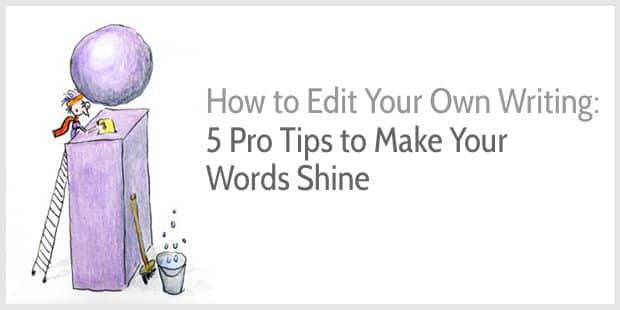 Helen browses her draft articles.
Helen browses her draft articles.
It’s time to clear up her archives.
Why did she never finish these posts?
Surely, she thinks, one of them must be almost ready for publication?
Excited, she opens her documents, one by one. She reads an opening here and scans the subheads there.
But slowly she loses her sense of optimism.
These articles are no good … Why is she such a bad writer?
Actually, that’s the wrong question.
We’re all bad writers. Even Nobel-prize winning authors write crappy first drafts.
And as legendary copywriter David Ogilvy suggested:
I am a lousy copywriter, but I am a good editor. So I go to work editing my own draft.
Writing a crappy first draft is normal. You just need to know how to turn it into shiny content.
Shall I explain?
What is good editing?
Editing is an essential part of the writing process.
While some people edit while writing, it’s often faster to make editing a separate stage.
To write a first draft, focus on getting your thoughts on paper. Next, revise your content to check for flow. Is the order of the sections logical? Are key arguments missing? Are some parts redundant?
Once you’re happy with your content—it’s complete and in a logical order, it’s time for editing sentence by sentence. Polish each sentence to make it concise, vivid, and human; and fine-tune the rhythm and tone of your writing.
Editing our own writing can be tricky as we read a text through our own eyes as the author of a text. We know what we want to express so we read that meaning between the lines—even if it’s not actually written.
To become a better editor, try to step into the shoes of your reader, and read your draft through their eyes. Read what IS written, not what you think is written.
1. Paint vivid imagery
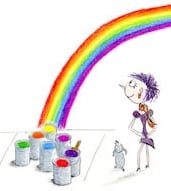 We often write in abstract language.
We often write in abstract language.
But that’s a problem because abstract language makes it hard for readers to visualize and understand our ideas.
For instance, in their book The Power of Moments, Chip and Dan Heath explain the difference between an abstract and a concrete goal in weightloss. Abstract is:
losing 20 pounds
A concrete goal is more motivational, such as:
fitting into my sexy black pants without gastrointestinal distress
Notice how that sketches a clear picture?
Making abstract language concrete requires some effort but it’s well worth it because it makes your writing more vivid and engaging. Readers will more quickly grasp your advice.
Editing tip for writers:
Read your text through your reader’s eyes. Can you visualize your advice?
To make your writing more vivid, it often helps to add an example—just like I did above. I used the snippets from Chip and Dan Heath’s book to show you the difference between abstract and concrete language.
2. Fine-tune the tone of your writing
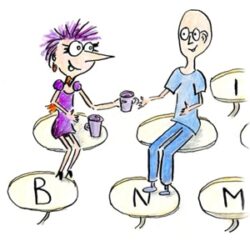 When writing a first draft, we often forget who we’re writing for.
When writing a first draft, we often forget who we’re writing for.
We write for a faceless crowd.
And that makes it sound like we’re lecturing. Our writing seems distanced or even robotic.
So, one step in the editing process is to make your writing feel more human.
Start by reviewing where you can engage your reader so it feels like you’re having a conversation. Address your reader directly using the word you and ask a question.
Have you tried that?
Next, pay attention to when your reader may feel a little stupid or down. Perhaps they feel like they’ve made a mistake. Or they wonder why they’re struggling to achieve their aims. Here’s where you can add a note of compassion. For instance:
We’ve all wrestled with crappy first drafts. It takes time to learn how to edit but take it step by step, and you’ll get better.
Lastly, when does your reader need a little nudge to implement your advice or to buy the product you’re selling? Here’s where you can get a little bossy:
Come on. Start editing your text. It’s more fun than you think.
Adjusting the tone of your writing is an essential part of editing. It’ll help shape your voice and make readers feel like you’re writing for them, personally.
Editing tip for writers:
Imagine your favorite reader and read your text as if you’re them. How does your writing make them feel?
Where can you engage them with a question? When do you want to put a virtual arm around their shoulders? When can you encourage and nudge them into action?
3. Cut wordiness
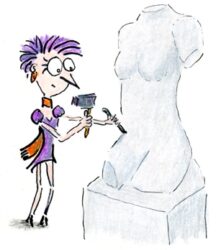 Wordiness slows readers down.
Wordiness slows readers down.
They have to plough through more words to get to the meaning of each sentence. The more excess words, the more exhausting reading becomes.
So, if you want to let readers glide through your text so they can grasp your ideas more quickly, make your writing more concise.
To practice concise writing, I like the Flip-Flop technique. Instead of scrapping weak words, you focus your attention on meaningful words. Here’s how it works:
- Read a sentence slowly
- Highlight the most meaningful words
- Rewrite your sentence by using the meaningful words
Here’s an example of a wordy sentence:
When I started my own business, it has given me a whole new perspective to see the bigger picture when it comes to finding a work / life balance.
And here’s the concise version:
Starting my own business has given me a new perspective on work / life balance.
Cutting wordiness is like sculpting your sentences. You remove any excess so your words can shine more brightly.
Editing tip for writers:
This editing step takes some practice and initially may feel time consuming so focus on sharpening the most important parts of your writing: Your headline, your opening, and your final paragraph.
How to avoid wordiness
How to write clearly and concisely (on the Flip-Flop technique)
4 types of weak words to eliminate
4. Add zing to your word choice
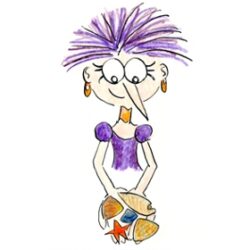 Playing with words is my favorite editing task.
Playing with words is my favorite editing task.
I like trying to find the best words to express my ideas. Plus, playing with words helps inject pizzazz into my writing.
In my word game, I follow a few simple rules:
1. Avoid difficult words where possible
I’m not writing to impress so I prefer using the everyday words my readers would also use.
This sounds unnecessarily complicated:
His writing is more likely to obfuscate rather than to enlighten readers.
This seems easier:
His writing is more likely to confuse rather than to enlighten readers.
If your readers are professionals or experts who use jargon, then it’s okay to use the same jargon, too. But if you’re using difficult words your readers don’t understand, it’s better to switch to simpler words. Or if no simpler word exists, explain the difficult word to your readers.
Good writers don’t try to sound smart; they make their readers feel smarter.
2. Choose a precise word with the right connotation
For instance, the word emulate has a more positive connotation than the word imitate.
Note the difference between these two sentences:
To find your voice, emulate the writing techniques of your heroes.
To find your voice, imitate your writing heroes and steal their writing techniques.
Using a thesaurus can be useful. But be careful. Synonyms often have different connotations. Choose the word that has the right connotation and expresses your meaning most precisely.
3. Weave a few sensory words into your writing
Readers experience sensory words as if they can touch your silky-smooth words, as if they can hear the creaking of your braincells, as if they can taste your pork tenderloin with double mustard and tarragon sauce.
To add a little pizzazz to your writing, sprinkle a few sensory words. For instance, instead of:
Unfortunately, I’m currently too busy to take on new projects.
Try:
Unfortunately, my schedule is jam-packed; and I’m unable to squeeze in new projects.
Sensory words can be used to spice up any writing, even business writing.
Editing tip for writers:
To sharpen your word choice, pay attention to the words your favorite authors use. Which words make you feel something? Which work resonate more strongly? Which words spark joy?
Next, nurture a sense of play, and have fun trying different words in your writing.
5. Let your words dance
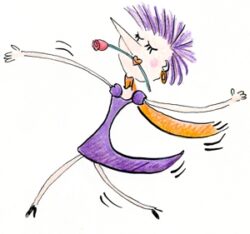 Have you ever listened to music during a workout?
Have you ever listened to music during a workout?
And did you notice how you vary the speed of your workout depending on the tempo in the music?
The rhythm in your writing influences readers, too. A higher tempo with shorter sentences gives energy. Medium-length sentences can add a sense of calm. And long sentences can accelerate a story or leave readers gasping for air.
A mix of short and long sentences creates a pleasurable reading experience.
Editing tip for writers:
Read your work aloud, and notice how the rhythm comes across:
- If the rhythm sounds too choppy, include a few longer sentences.
- If your writing lacks energy, try to chop up a long sentence and include a few shorter sentences. Broken sentences can work, too.
- If you stumble over your words, rewrite a sentence.
- If sentences don’t seem to follow each other logically, rewrite for clarity and add transitions.
Watch out for unhealthy perfectionism
I remember writing my first guest post for Copyblogger. It was early 2012.
I had read 6 books as well as numerous blog posts about writing, and I had summarized the main tips in a list with 58 tips. I had edited my text with a sharp knife. I had removed each redundant word.
Still, evening after evening, I was swapping one word for another to see whether it sounded better. I moved a tip up or down. I added a comma.
Sound familiar?
At some stage, editing efforts don’t make a difference anymore. It’s the law of diminishing returns. The first changes you make are big changes and make a big difference, but later changes? Your readers won’t notice the difference.
Knowing when to stop editing was a tough lesson for me. But if I wanted to publish more, I needed to get more pragmatic, overcome my publishing anxiety and understand when my text was good enough.
Understanding your inner perfectionist when editing can help you speed up.
Editing is fine if you’re enjoying it and improving your text.
Editing becomes a problem when you keep dithering because you’re nervous to hit publish, and you’re afraid of what others may say.
So, find your balance. Edit to improve your text. Have fun.
Then let go, and start your next piece of writing.
Happy editing!
Recommended reading on editing:
An example of how to self-edit your writing
How to write clear and concise sentences
How to revise one sentence: An example


Editing is itself a crucial part. As a non-native English writer, I always try to fix a few flaws or hire someone who can fix the issues for me.
It is good to know how one should edit his writings.
Yes, so true. Editing is crucial—for both non-native and native English writers. I’m a non-native English speaker, too.
Extraordinary post.
Thank you so much for your guidance.
God bless.
Thank you!
Wow, I am a writer for 2 years but I still I am fully failed to know how I edit my writing. After great research, I reached here, and honestly, this article proves very helpful for me. Thanks.
You’re not failing editing! We’re all learning and getting better. I’m glad you found this article and found it useful. Happy editing!
“…concise, vivid, and human…”
Do we ever arrive to a place of writing that way the first time? I hope it! 🙂
My favorite reader has no problem with three- or four-syllable words, and I wish there were more like her. Absolute preciseness is so much fun.
I’ve been watching a few YouTube shows from the man who used to cook for the Queen. He demonstrates how he made food then with immense precision and in short time.
I want to do that in writing. Is there hope? Please tell us you don’t take as long as you once did. 🙂
I don’t think it’s possible to arrive at writing that’s concise, vivid, and human in one go. As you suggest, it would be a pity wouldn’t it? I’d miss the editing stage. For me it’s the best part of writing.
I’ve found that editing is easier than it used to be as I spot how to improve sentences more quickly. Probably my first drafts are also better than they used to be. But I still edit over several rounds. Maybe I’m also getting more critical?
No! I cannot imagine you overly critical. I maybe have learned to be less verbose. Isn’t verbose a fun word! Haha!
This content is a piece Indeed… 👍
Thank you, Jude. Happy editing!
Wow, what great content. The editing tips are really gonna help me a lot.
Thank you, Bushra. I’m glad you found it useful. Happy editing! 🙂
So much value here. My favorite phrase—it’s tough; there were many—is “Good writers don’t try to sound smart; they make their readers feel smarter.” Exactly. Adding something unexpected to your writing, something that makes the reader go, aha, got it—creates a connection to your reader. And yes, big words are just a sign of insecurity. I’m saving this article. Thanks!
I’m glad you enjoyed this, Sharon. Thank you for stopping by. Happy editing!
Hi Henneke,
Great post! As a writer myself, I learned a lot from your article. I will be taking all your editing tips into account the next time I edit any of my piece. I have bookmarked this article so I do not forget about these tips. Also, I will share your article with other people in my network to help them as well. Thanks a lot for sharing your insights with the community, it will help us a lot.
Thank you for your comment and for sharing, John. I appreciate it. Happy writing!
Yes Henneke, you have given so much here. Thank you. Rest assured that givers receive so much in return. It’s law. So, here’s to your receiving.
Thank you, Andrea. I appreciate your encouragement.
Henneke, you always have such great tips.
I always learn so much and get great enjoyment reading your posts.
I am slowly getting better at getting the words on paper without worrying about trying to make it perfect the first time. It never works out perfect the first time anyway no matter how hard you try. So, I just get the ideas down and worry about the rest after.
“Let your words dance” – this is great!
SharlaAnn
Thank you for your lovely comment, SharlaAnn.
Do you also find writing goes faster when you get your ideas down first and edit later?
Yes, absolutely. I’m not interrupting the flow of my writing by trying to edit at the same time. It sometimes takes a bit to figure out how to say what you want to say; so get all your ideas down first, then come back to edit.
That sounds good! 🙂
Hi Henneke:
I always say, “Even an editor needs an editor!” Conciseness is always a struggle for me because I love splashing around in words, as you know. But I’m finding over time and with experience, ruthlessly editing makes for stronger writing. And one of the most helpful things for me is definitely reading aloud to find stumbling wording or awkward writing.
I like pantsing it but find clarity in the outlining process, so even if I freestyle work, I try to revise it to fit a logical framework even as an editing technique. Also, I’m hopeless with editing as I go…even when I’m trying not to!!
Finally, one of the most helpful ways to improve writing, I learned from you!, and it’s about the impact and significance in each specific word you choose. Besides adding pizazz, other things like tone, personality, and style shine through as well as sincerity or playfulness. I also note that lately, I’m more watchful of redundant words or thoughts. It’s surprising how much just changing a repetitive word adds to your writing, making it more powerful and interesting.
Well, thank you again for sharing your insights and for helping writers with every post! Cheers and sunshine to you, Sue-Ann
It’s always a balance, isn’t it?
Too much ruthless editing takes the life out of our writing. We need some vivid details, personality, and pizzazz.
But too many details slows reader down too much and can make our writing overwrought.
I like your suggestion to focus on eliminating redundant thoughts. That makes a big difference to the pace of writing.
Thanks so much for stopping by again, Sue-Ann. I much appreciate it—as always. ☀️🧡
“Good writers don’t try to sound smart; they make their readers feel smarter.”
Thank you!
That golden nugget is worth the price of admission for this savory post.
Wrote it down on a post-it note. It now lives on the upper right-hand of my screen.
Question.
You live in England, right? The holidays are upon us. Are you familiar with something called bread sauce?
The reason I’m asking is Stanley Tucci in his current best-seller “Taste,” talks about how he “edited” out it from his British wife’s X-mas feasts.
Describing it as, “…bowl of mush…Bread sauce is very white bread soaked in milk, which looks and tastes like something Mr. Bumble and his ink would have given to workhouse boys or toothless Victorian pensioners…not my favorite.”
I’m curious about your thoughts and comments based on any first-hand knowledge.
Thanks again.
And Happy Holidays!
Yes, I live in England (but didn’t grow up here). I’ve vaguely heard of bread sauce but I’ve never had it. It sounds drab. I don’t think I am going to look for it to try!
Best wishes for Happy Holidays to you, too.
Thanks for stopping by again, Phil.
Hi Phil,
I’m not from England, but growing up I use to eat bread and milk sprinkled with sugar with my Grandpa all the time. It was one of our favorite bedtime snacks. Couldn’t imagine eating it now though, and I’ve never passed the tradition on.
Thank you, Henneke, for your post. It’s “sublime”. “Sublime” is a word that in Italy we use when we talk about music and art. And I have noticed that you used the Italian word “tempo” referred to music 😉
I have a big question that has been touching me for many days. I don’t like social media: Instagram, Facebook, Pinterest… perhaps a bit Twitter.
I can use social media to listen to other people, but I don’t like to invest my time and my writing on them.
I prefer writing for a blog or a magazine. I am a journalist and, following your example, I have learnt that I need to listen to my readers. You have taught us how it is important to resonate with our readers; and blogging is a way to resonate with our ideal reader.
So I ask you: am I wrong in my choice to ignoring social media (FB, Instagram and so on)? Am I wrong if I believe that writing an article for my blog can be the better way to help my readers and resonate with them?
Or am I missing something when I prefer not to spend my time writing for social media?
Thank you for your sublime compliment, Maurizio 🙂
Social media can help to start conversations and also to spread the word about your blog. But I don’t think social media is a must. I’ve spent very little time on social media in the last 3 years, just posting 5 – 7 times a week on Twitter and only replying when I’m mentioned on LinkedIn, not posting anything else anywhere. I don’t even have a Facebook account.
So, it’s possible to focus on blogging as long as you have another method of attracting new readers to your blog. I mostly rely on search engine optimization and word of mouth to get new readers to my blog. For me, the conversation mainly takes place here in the comment section, in my inbox, and in webinars for my courses.
Great post Henneke my quesition is how can you know a sensory word? is it an object like food? for example “Jam-packed”.Please help me understand how you pick sensory words.
thanks
Thank you, Lubosi. I give a lot of examples of sensory words (and how to use them) here: https://www.enchantingmarketing.com/sensory-words/
Hi Henneke,
Can you share your suggestion on – When we should consider content editing in our old posts?
The following three articles provide useful guidance on updating old posts:
https://medium.com/@HubSpot/how-we-tripled-our-leads-using-this-rarely-discussed-blogging-tactic-4eb78ba938e4
https://www.orbitmedia.com/blog/update-old-blog-posts/
https://www.animalz.co/blog/content-refresh/
Thanks for another great post, Henneke! Your comment about dithering really hit home. I can look at my content 10 times and find something to change every time. I always thought it was due to my tendency to procrastinate. Now I’ll blame my inner perfectionist–sounds much better.
Thank you for stopping by, Diane!
I didn’t count how many rounds of editing I did for that first Copyblogger article but I wouldn’t be surprised if that was close to 50 rounds of editing. Maybe even more. I think we all know when we’re honest with ourselves when our editing still makes a difference and when we are becoming overly perfectionist.
Hi Henneke, love how you give quality tips.
The part that my content work is still lacking in is the usage of both long and short sentences. Yeah, it is quite lacking in that aspect.
But with what I just learnt, I will try implementing them to see how my work flow changes over time.
Amidst, thanks for the quality advice
Thank you, Ifeoluwa.
What helped me a lot is to read writing aloud and pay attention to the rhythm. First, read other writers aloud. Next, read your own writing aloud and see how it compares.
Happy writing!
I love the sensory words tip best of all, even though I usually forget to edit that way. Darn. But you use it yourself with such finesse – I love seeing how you do it!
Hello from lockdown-ready Holland, from a writer who only edits while she writes 😉
That’s my favorite tip, too. And thank you for your compliment 🙂
It sounds like not everyone in the Netherlands feels lockdown-ready. It feels tough. Be safe and well.
Thank you,Henneke!
Enjoy reading every one of your newsletter .
Thank you, Emma. I appreciate that.
Thanks Henneke
This was very helpful. I love those illustrations on the side. Definitely add to the writing. Do you have tips about illustrations too?
Thank you, Shosnahan. That’s a lovely compliment.
I have written about how I create my illustrations (and come up with ideas for illustrations) here: https://www.enchantingmarketing.com/blog-images/#infographic
I like to use sensory words and weave the rhythm as I write my first draft. It may take a little longer, but it makes writing the first draft feel like fun instead of a chore.
Yes, it works for some. Go with what works for you. Making it feel fun sounds good 🙂
Hi, Henneke, thank you for sharing , it give me a lot of insight after reading it, before i have struggling about how people start to write their blog.
Since i never do it before.
The easiest way is to write a blog post is to do it step by step! Trying to do everything in one go can feel overwhelming—and it makes me procrastinate. I even spread the work over more days so it never feels daunting, and I feel fresh each time I look at a blog post again.
Incredibly helpful as always Henneke. Thank you. Now feel ready to tackle some tricky Tudor mince pie editing of my own 🙂 Writing not eating.
I hope that after the editing you can treat yourself on one or two minced pies?
You slipped up!
I had to copy and paste “Chip and Dan Heath’s book” to buy the audiobook on Amazon.
If you had linked it, I would prefer to have bought it through your link as a “Thank You” for an excellent lesson on writing.
Ah, yes, I usually add links to books I’ve mentioned at the bottom of a post but forgot to do that this time. It’s more a courtesy towards the authors.
I hope you’ll enjoy the book!
Had al gezegd hoe enorm trots ik op jou ben???
😘
Ik ook op jou!
Hi Henneke, I need to work on my sensory words as I often only get right to the point. Slowing down my writing would surely help me to be more creative and invigorate my writing skills. I love how you always explain your tips with precise examples. Thank you!
I find it a fun exercise to pick a few different words. You don’t need a lot. It’s just like with adding spices to food. Just add a little extra flavor.
Thanks for stopping by again, Lisa. I appreciate it.